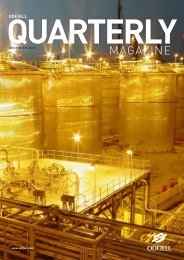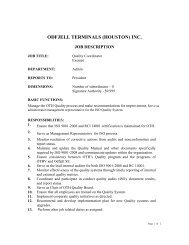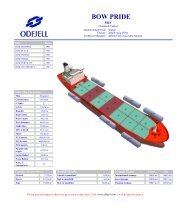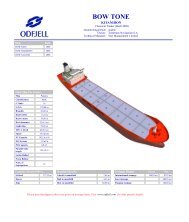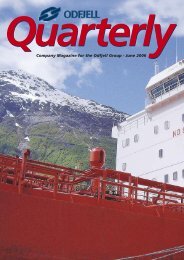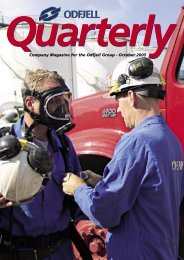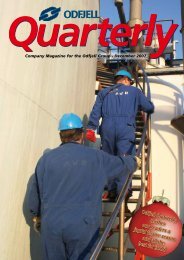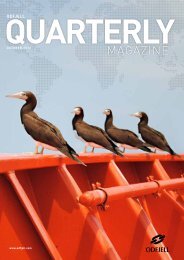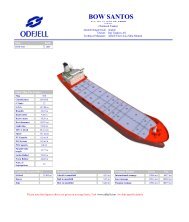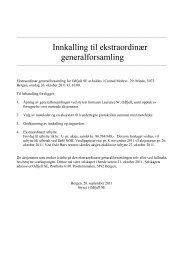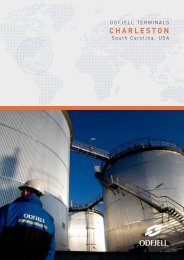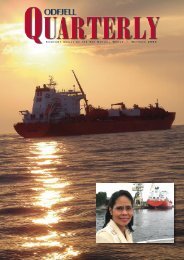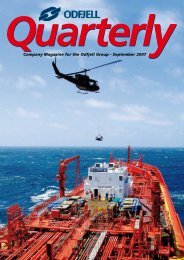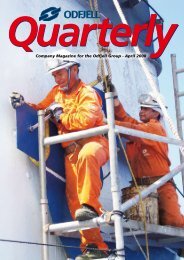You also want an ePaper? Increase the reach of your titles
YUMPU automatically turns print PDFs into web optimized ePapers that Google loves.
By Toralf Sørenes<br />
HSE Issues and Transparency<br />
In this world of collaboration and transparency,<br />
our customers expect that we,<br />
as one of their strategic service providers,<br />
communicate not only commercial<br />
but also HSE issues of significance. With<br />
today’s control systems, almost every<br />
negative outcome of what we do will<br />
come to light sooner or later. It is therefore<br />
very important to be proactive and<br />
notify relevant stakeholders of any problems<br />
as early as possible. A brief note is<br />
better than nothing. Early reporting has<br />
two advantages. Advice and guidance<br />
can be obtained at an early time when<br />
it can still be useful. Further, it will<br />
reduce and could<br />
even take away the<br />
negative perception<br />
of us trying to hide<br />
things. Although<br />
potential sanctions<br />
could act as a hindrance<br />
for openness,<br />
it is important to recognize<br />
that if sanctions<br />
are relevant,<br />
they will normally<br />
come. Port state and<br />
similar databases are<br />
monitored continuously,<br />
and if we wait<br />
with notifications<br />
and reports until it<br />
has become known<br />
through other sources,<br />
sanctions will<br />
come and be stronger.<br />
With a large fleet of nearly 100 ships<br />
such as <strong>Odfjell</strong>’s, the probability of having<br />
an incident that reaches the media<br />
is higher than if you own and manage<br />
a small fleet. The Law of Large Numbers<br />
implies that the bigger you get,<br />
the more important it will be to work<br />
proactively and systematically with risk<br />
reduction and loss preventive measures.<br />
Let us for instance consider port state<br />
detention. This is a very serious matter<br />
that must be sorted out before the ship<br />
is given clearance to sail from a port.<br />
But this is not the end of it; underlying<br />
issues and customer concerns may take<br />
a long time of hard and dedicated work<br />
to sort out.<br />
One issue that has been in focus for<br />
some time is inerting of all flammable<br />
cargoes. With the Bow Mariner and NCC<br />
Mekka still clear in mind, <strong>Odfjell</strong> has<br />
been active in this work and has strongly<br />
supported a change towards more robust,<br />
comprehensive and clearer regulations<br />
in this important area. While we<br />
are waiting for these new regulations to<br />
come, we must maintain a strong focus<br />
on inerting. It is a very high risk area involving<br />
two main elements: the equipment<br />
itself and the proper use of it.<br />
1 - The system with its various equipment<br />
and controls must be well maintained<br />
and operable at all times.<br />
Personal Protective Equipment – USE IT!!<br />
2 - Those responsible must be fully familiar<br />
with the systems, equipment, its limitations,<br />
operation and the underlying<br />
requirements. Guidance and procedures<br />
must be clear and implementation done<br />
not only through written exchanges<br />
but also through training and on board<br />
attendance from the fleet units ashore.<br />
In addition to oily water systems and<br />
pollution, inerting has high focus within<br />
port state administrations in the trades<br />
<strong>Odfjell</strong> operates. In particular the US<br />
Coast Guard seems to have their focus<br />
on this. This is perhaps particularly relevant<br />
for our older<br />
ships. We may not<br />
be using these systems<br />
as frequently<br />
as product carriers<br />
do, and therefore<br />
testing and regular<br />
training is essential.<br />
It is also important<br />
to be well prepared<br />
for port state inspections,<br />
with the fleet<br />
units discussing all<br />
relevant issues in<br />
that respect. All our<br />
ships must report unsafe<br />
conditions and<br />
defective equipment,<br />
and appropriate risk<br />
assessments must be<br />
carried out on operations<br />
that deviate<br />
from normal routine.<br />
It is also essential that corrective and/or<br />
preventive actions that have been identified<br />
by the shipboard management<br />
teams during the risk assessment are<br />
timely and properly attended to, not<br />
only by themselves but also by the fleet<br />
units ashore.<br />
Safety Bulletin<br />
We always focus on the use of appropriate<br />
personal protective equipment<br />
(PPE), during internal audits and ship<br />
visits, and as part of reviewing near<br />
misses and high risk incidents. Regrettably<br />
we still come across events or situations<br />
where PPE should have been used<br />
but was not. We will again highlight the<br />
importance of strict adherence in this<br />
area whether it is working aloft, entry<br />
into enclosed spaces, cargo lines and<br />
systems on deck, etc. Both the general<br />
and individual PPE like non skid shoes,<br />
helmets and boiler suits, and more task<br />
specific PPE like harnesses and personal<br />
gas detectors are important. If we shall<br />
progress towards our zero accident<br />
goal, we must have high focus on critical<br />
success factors among which the use<br />
of PPE is essential. USE IT!!<br />
ODFJELL Quarterly September 2006 23



